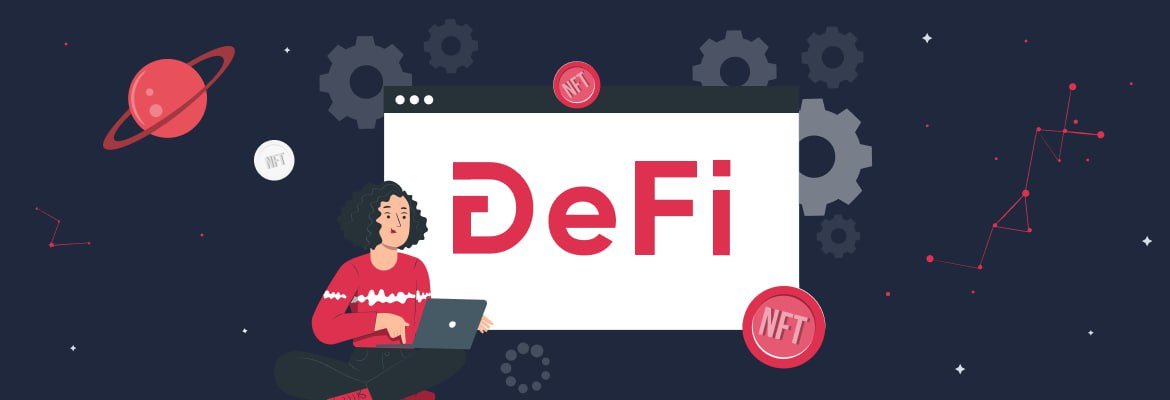Let’s talk
- Your message has been sent!
Apr 14, 2023 / Updated:Jul 12, 2023
The Role of NFTs in DeFi
Two big blockchain trends - NFT and DeFi, can come together to create new use cases and unlock more potential. We often think about NFTs as a form of art, collectibles, and in-game items and about DeFi as an ecosystem of decentralized finance apps. In this article, we'll explore how NFTs can work with DeFi, and how DeFi applications can benefit from NFT development.

Why Does the Interaction between NFT and DeFi Sectors Matter?
Say "blockchain and crypto," and Ethereum, NFTs, DeFi, and tokens will surely be among the first names to come to your mind.
Ethereum is the leading blockchain powering various assets and applications. Ethereum technology allows the creation of fungible tokens like Ether, non-fungible tokens like virtual goods in the metaverse, and various protocols powered by smart contracts. NFTs and DeFi are the most actively evolving spaces built on the blockchain.
NFTs are one-of-a-kind assets that represent proof of ownership. Through NFTs, people can own, create, and monetize digital goods. NFTs can represent art, collectibles, domain names, real estate, and more. These assets store value and can serve financial and investment purposes.
DeFi is financial services powered by smart contracts. It aims to provide an alternative to traditional finance instruments by providing automation and transparency. DeFi offers users various services like trading, lending, and borrowing, thus allowing them to put their cryptocurrencies to work and earn income.
Leveraging the possibilities of NFTs and DeFi creates a bunch of solutions enabling new financial mechanisms and experiences.
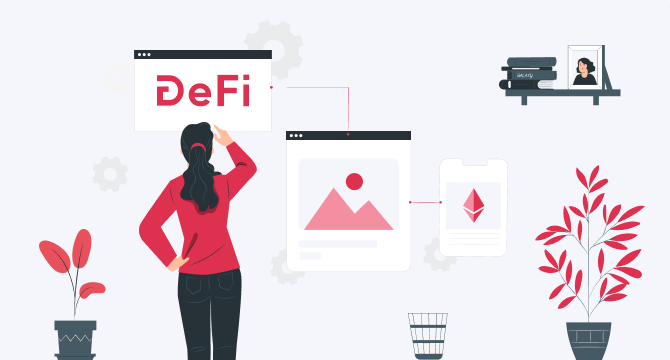
What Are the Benefits of DeFi?
Tens of billions of dollars are currently locked in DeFi. Based on smart contracts, DeFi protocols run without intermediaries like banks and brokers and execute transactions in a transparent way. Interest in DeFi is growing, and its adoption is expected to increase significantly. According to Visa, businesses are looking to the space to offer their customers more financial options. Let's see what benefits DeFi presents:
Transparency. Powered by blockchain, DeFi offers transparency as all transactions, data and codes are visible. Everyone can view how smart contracts work and what transactions are taking place.
Equal access for everyone. DeFi enhances financial inclusion, providing tools for the unbanked and underbanked. DeFi protocols allow everyone to access financial services such as loans and investments regardless of their location, banking history, or political views.
Programmability. Developers can create smart contracts and decentralized applications to provide automated solutions. Smart contracts present logic and predetermined conditions which function automatically in response to certain actions.
Interoperability. Different blockchain protocols can communicate (interoperate) with each other by exchanging data and tokens. Due to the ability to read data from one blockchain and write code on another blockchain, developers can create a wide range of DeFi products.
Self-custody. To interact with DeFi protocols, users don't need to fill in personal information or trust a third party. They just need to connect their Web3 wallets and be in control of their data and funds.
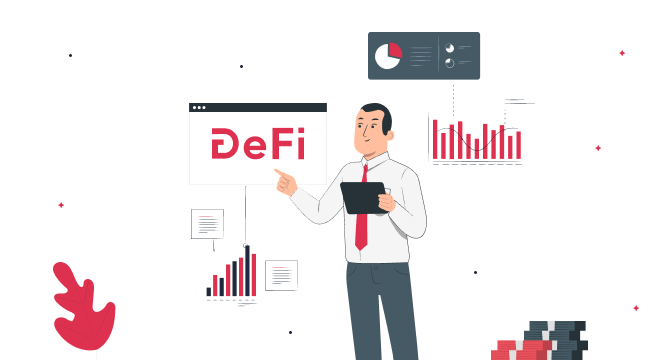
What Are the Use Cases of NFTs in DeFi?
NFTs in DeFi provide additional utility which goes beyond expensive avatars. The interaction of the sectors creates new applications and provides users with more trading and investing opportunities. These emerging use cases are growing in popularity and can contribute to the mainstream adoption of DeFi. Here are some ways to use NFTs to access financial services.
NFT lending
NFT owners can supply their tokens representing art, real estate, or other assets to borrow cryptocurrencies or fiat money against it. NFT lending works like crypto lending in DeFi protocols and is powered by smart contracts. Lenders can earn interest for their contribution to an NFT liquidity pool, and borrowers can withdraw their collateral when they meet the loan requirements.
NFT renting
NFT renting is similar to lending as both involve borrowing with the use of NFTs. However, the difference is that lending protocols allow users to get loans providing NFTs as collateral, while renting protocols allow both lending and borrowing NFTs. Mainly, NFT renting is used for Play-to-Earn games. Gamers can use their rented items to unlock new experiences and earn income. Also, platforms allow users to rent virtual real estate, popular NFTs, and more.
NFT staking
Through NFT staking, it is possible to monetize assets without selling. NFT owners can earn rewards by depositing their assets in a DeFi platform. Interest may be in the form of a DeFi platform token or another NFT. It's important to take into account that different platforms have different rules for staking, and they may offer staking options for certain NFTs.
NFT fractionalization
NFT fractionalization is when the ownership of a token is divided between several people. It presents benefits for pricing and liquidity in the NFT market. For an NFT to be fractionalized, it is locked into a smart contract, which distributes fungible tokens, for example, ERC20, to parties. The tokens represent shared ownership; owners can trade their tokens on Decentralized Exchanges, which will make the underlying NFT more liquid.
NFTs for Insurance
Decentralized insurance is based on smart contracts and provides transparency and automation. NFTs, in their turn, represent unique digital assets that are immutable, meaning it is impossible to change, remove, or copy them. This makes them effective solutions for decentralized insurance, which can enhance user experience and help companies automate their processes. Insurance policies can be programmed into an NFT, and then people can buy, sell, and transfer them.
NFTs in DeFi governance
DeFi projects have governance tokens allowing owners to vote on various decisions. The more tokens a participant has, the more decisive their vote. NFTs bring decentralized governance to another level by expanding possibilities. There can be transferable or non-transferrable NFT governance tokens, rare NFTs representing unique voting rights, and more.
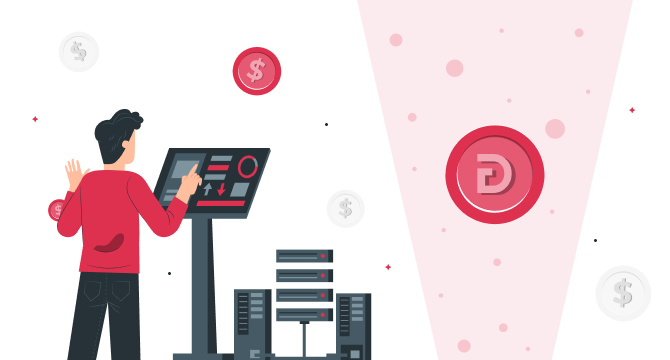
Takeaways
NFTs are transforming DeFi by creating new use cases and attracting more people to the space. At the same time, the financialization of NFTs unlocks new opportunities for creators and token owners, who can put their assets to work. The communication between the two is evolving, powered by new ideas, solutions and mechanisms.
Following developments of the NFT × DeFi space closely? What about taking part in it?
We are here to help you discover a spectrum of opportunities and build new, practical tools. Our team has technical expertise in developing various DeFi and NFT projects, and we look forward to bringing your idea into reality. Reach out, and let's drive change.

Articles
-
 What Are Decentralized Exchanges? Meaning, Examples, and Benefits
What Are Decentralized Exchanges? Meaning, Examples, and Benefits
DEXes (short for decentralized exchanges) are places to trade cryptocurrencies, and they …
Jul 13, 2023
-
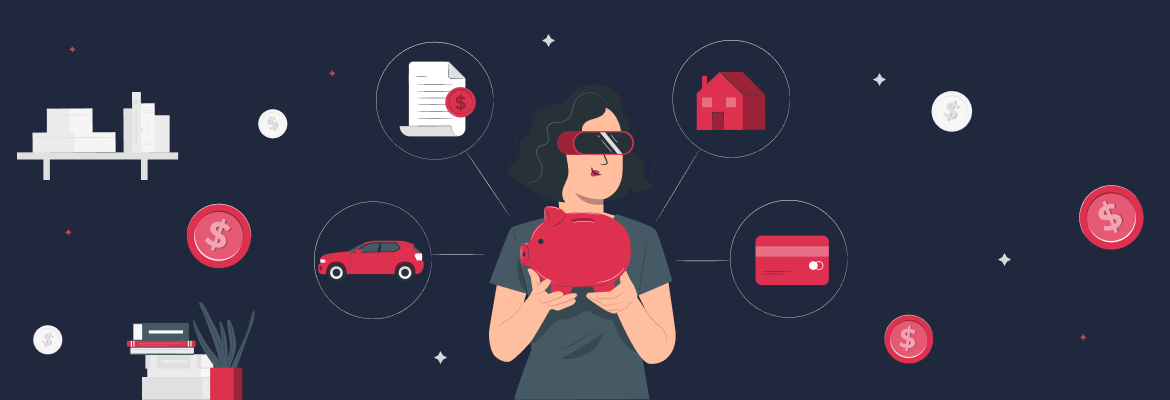 The Impact of the Metaverse on Banking and Finance
The Impact of the Metaverse on Banking and Finance
The metaverse has captured the attention of banks and financial institutions as …
Jun 15, 2023
-
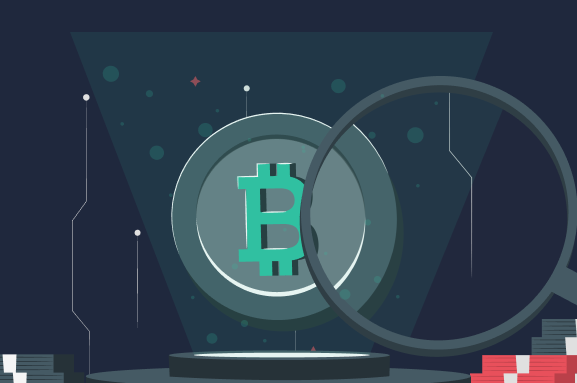 What Is Blockchain Technology?
What Is Blockchain Technology?
While exploring emerging technologies and learning about recent tech news, you will …
Apr 20, 2023
